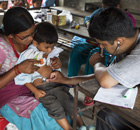Health Is More Than Just Freedom from Disease
It’s 11 AM on a Thursday, and Ama Sita is having trouble getting up the stairs from the road to the Jitpur Community Health Post. The sound of children reciting their lessons wafts from the adjacent primary school as she enters the small clinic, breathing heavily. She takes a seat next to Sanubabu Koirala, the director of the health post and himself a senior auxiliary health worker. Sanu wraps a blood pressure cuff around Ama Sita’s arm, places his stethoscope strategically below it and listens intently.
“High blood pressure”, Sanu nods. He sets aside his stethoscope and scribbles some notes on a prescription form. Ama Sita is also complaining of gastric discomfort; Sanu applies his stethoscope to her belly before diagnosing acid reflux. He scribbles some more, then hands the form to his patient. She will collect some medicine from the clinic’s tiny pharmacy, which doubles as a registration/intake office.“Physical exercise is really what she needs”, Sanu shrugs; “and to reduce the salt in her diet. But patients only follow that advice when it comes from Dr.Laxmi.”
Dr.Laxmi is VIN’s all-purpose medical expert. He sees patients at this health post two days a week, in between checking children at the monasteries and nunneries VIN works with and fielding calls from newly arrived volunteers suffering their initiation-by-diarrhoea. His examination room at the health post is spartan: a desk, two chairs, an IV stand, an examination table and a basin. Up on the wall is an eye chart, a light box for examining X-rays, and a scary-looking poster warning of filariasis: a mosquito-borne disease that causes irreversible disfigurement. “Only three people in Jitpur suffer from filariasis”, Sanu informs me. The disease is more common in the mosquito-ridden, lower-lying areas of Nepal.
Meeting Local Needs
The Community Health Post has functioned in Jitpur since 1994, getting by on minimal government funding and support from the local village development committee. It’s the only health facility in Jitpur—more serious cases must be transported to the nearest hospital, some kilometres away. The six staff members include physician’s assistants and a nurse midwife, all of whom work daily to serve the 500 or so patients who come through the doors each month.
Until VIN got involved in 2002, the Jitpur Community Health Post had no doctor and was obliged to function with even less equipment than it has now. Today a small pathology lab upstairs from the clinic is able to process samples, speeding diagnosis and treatment. The district health authority continues to fund the medicines the clinic dispenses; but the health post’s budget continues to fall short of its needs.
And there’s plenty of work to be done. “This is an agricultural area”, Sanu explains, gesturing toward the surrounding green, terraced mountainside, “so many of the health problems we see here are related to injury and exposure to agricultural chemicals.” But he traces Jitpur’s most common health complaints to two causes: roads and garbage. “You’ve seen the condition of the roads”, Sanu says. “There’s a lot of respiratory disease here.” He doesn’t have to explain. Buses and trucks rumble through the village all day long, belching fumes and raising dust on the untarred main street. Any solution to this ongoing problem will have to come from the government, whose responsibility it is to maintain the country’s roadways.
As for garbage, this beautiful rural village (like much of Nepal) is sadly littered with plastic bottles and bags, snack packets, decomposing cardboard boxes, construction trash and random discards that have endured too much sun and rain to be identifiable. There is also plenty of rotting organic matter: “very smelly”, Sanu remarks, wrinkling his nose at an open window.
Here, the solution must begin with education. Simply tossing aside unwanted materials is a deeply engrained habit amongst Nepal is, and Jitpur’s municipal trash collection service appears to be making barely a dent in the volume of garbage strewn across the area. Dr.Laxmi is active in talking up personal and environmental hygiene during his school visits—what Sanubabu Koirala calls the clinic’s “health advocacy” initiative and VIN reinforces this re-education project through the children’s clubs it has established at all eight village schools VIN’s toilet construction project is making further progress in environmental upliftment , but much more needs to be accomplished in this important area.
Moving Forward
With the single exception of lab tests, all services at the health post are free to patients. Staff are kept busy treating colds, diarrhoea, wounds and lifestyle-related health problems such as Ama Sita’s. Thus the only funding the health post receives comes from the district health authority, which is supplemented by a very small government grant. VIN covers Dr.Laxmi’s salary and solicits donations of needed equipment. The bottom line, for the health post, is a wobbly one. Two crucial staff positions remain vacant for lack of funding.
Yet despite the urgent need for an increased operating budget, the main problem Sanu and his team face is the fact that the building they occupy is unsuitable for their purposes. It’s a bare-bones cement structure tacked on to a primary school, suited perhaps to school administration activities. Local political authorities have granted the community health post a piece of land on which to situate a new facility, but Sanubabu Koirala estimates that it will take 10 million Nepalese rupees (about $110,000) to build it.
A little goes a long way in Nepal. In many other countries, $110,000 wouldn’t even cover the architect’s fee. Yet this same sum can create a substantial improvement in the quality of life for Jitpur’s hardworking residents—one that will continue to impact on community life for decades to come.
VIN will do all it can to interest prospective sponsors in supporting this important project, but we can’t do it alone. Any community health care fundraisers out there, eager to make a real difference?


 Member of
Member of